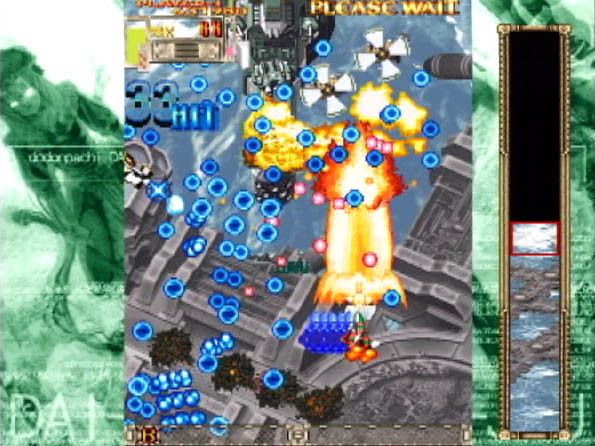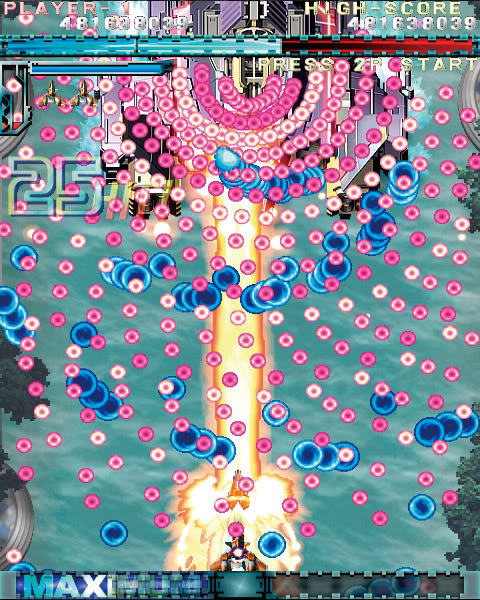As noted recently, I’ve been playing a whole lot of shmups. A terrible, awful lot of shmups. The goal isn’t just challenge, however; I think something deeper arose around the time I realized how basic they really are. Just about every single one of them contains two whole buttons – shot, and bomb – with minor button additions for subtle complexities. What makes them work well, and separates the bad ones from the good ones, requires a holistic understanding of the game’s systems down to the very essentials. You must understand the level design, the scoring system, enemy patterns, bullet patterns, the size of your ship’s hitbox, the ship’s movement speed, the radius of the regular shot and/or other weapons (such as, say, the laser), what bombs do, when bombs don’t work, how to score, how to score to get extra lives, and how to live.
When you actually sit down and start processing what, exactly, you’re doing in the game, it sounds (and, admittedly, looks) terribly complex. But, in reality, you’re mostly doing it through a combination of hand-eye coordination, muscle memory, and good reflexes. In some ways, I would call it the most basic genre of them all, since the barrier to entry (at least for the most part; I’m not counting the crazier sub-genres) remains incredibly low. And yet, in other ways, they give the greatest challenge and require the most effort to clear properly (obviously via 1CC, although plenty of people would disagree).
That said, saying you can climb the mountain, and actually climbing that same mountain, takes two different kinds of attitudes to their limits. I feared the climb. You can know a lot about something, and yet fail to really understand it without doing it yourself. So, I’ve taken my efforts to develop the necessary skills to play the shooting game at a higher level than I’m used to playing. First, I focus on survival, and then we’ll see whether scoring sits in my purview. Thankfully, the skills from these games cross multiple games (how about, all shooters?), so you simply must pick one and learn that one to ease yourself into the process.
So, because I’m an idiot and clearly don’t know when to quit, I played quite a bit of DoDonPachi – Dai-Ou-Jou. I clearly gave it a sterling review, but that does not mean I ever actually cleared it. On the contrary; most people consider it one of the hardest shooters ever made, and in a genre this dense with difficulty that’s saying something. Well, in particular, there’s one boss (in the White Label initial release, at least) that give me, and probably every other person who plays the game, a host of trouble. The pattern of the second stage boss, from what experience (and MAME save states) tells me, is semi-randomized and clearly meant to mess you up no matter how many times you try him. The second half of the video below should demonstrate this clearly:
I might be out of my mind. Why would I constantly retry this, over and over again?
Well, for one, I believe that the game designers would not intentionally make this unfair. Yes, the odds are clearly NOT in my favor, but that doesn’t mean the strategy does not exist. Even if the strategy consists of “bomb, bomb, then bomb again”, it might take time to admit defeat. Your natural instinct in the game, to thread the patterns, might not work all that well here, as I demonstrate. That cross-hatch pattern in particular does a number on me, and only an insane amount of practice to learn each pattern individually will prove to create victory. Apparently they fixed this in the Black Label variant, but I’m no quitter! Or maybe I should be?
It says a lot that I do not desire to stop playing the game, even after dying a million times or so (rough estimate, but you get the picture). I’ve improve substantially…off camera, of course! Recording yourself playing this game is nerve-wracking, and I am not surprised that live-commentary shmups aren’t a thing. But, the game continues to be fun, at least to me, and part of it comes down to the seemingly insurmountable challenge. Previously, I could not even begin to beat the Stage 1 boss consistently; even in that run up above, I didn’t actually need to bomb until my huge, catastrophic mistake. That makes the fact that I lived through Stage 2 amazing, as well as the unbelievably great scoring run towards the back half (note that I chained the entire thing; I’m pretty happy with that!). That continual, and tangible, sense of improvement comes about in just about every arcade game; you just need to put the effort in to see the fruits of your labor.

Of course, what makes shooters function so well in that respect is the razor-thin margin for error. All but one hit stands between you and death; several deaths means a game over. It encourages the player to strive towards perfection, to know the game as a whole, and learn everything about it down to the very technical details and timing (the chaining system will drive you bonkers). You must simply lose your fear through continual understanding. That’s really all it takes. I was pretty awful at this genre; I’m still pretty awful, but I’m getting better, and those results encourage me to keep going. I don’t fear death because I’m going to die anyway, so why worry about it?
I would encourage you to try these games out! Yes, they are niche, and yes, they are hard to learn, but there are things in life worth the effort. Let go of your fear, and you’ll find yourself doing pretty amazing things! There’s plenty of Biblical examples, if you’re curious…
The Lord is my light and my salvation;
Whom shall I fear?
The Lord is the defense of my life;
Whom shall I dread?
2 When evildoers came upon me to devour my flesh,
My adversaries and my enemies, they stumbled and fell.
3 Though a host encamp against me,
My heart will not fear;
Though war arise against me,
In spite of this I [b]shall be confident.Psalm 27

